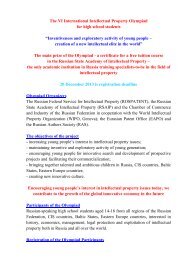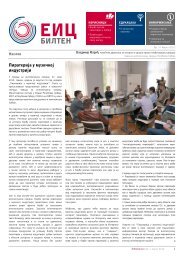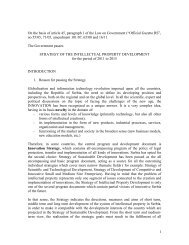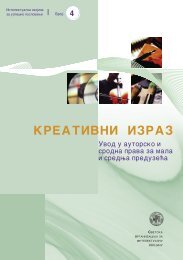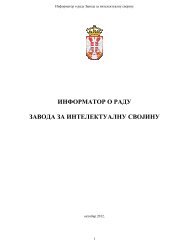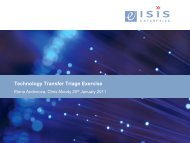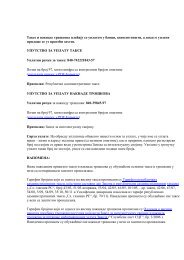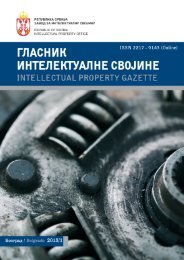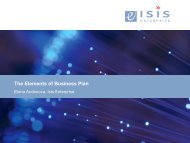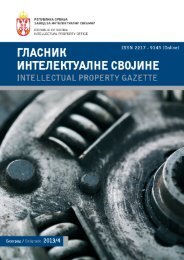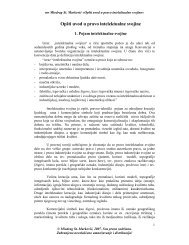Editable PDF Form PCT/RO/101
Editable PDF Form PCT/RO/101
Editable PDF Form PCT/RO/101
Create successful ePaper yourself
Turn your PDF publications into a flip-book with our unique Google optimized e-Paper software.
BOX No. V<br />
Designations (Regional and national patents) (Rule 4.9):<br />
Upon filing of the request, the applicant will obtain an automatic<br />
and all-inclusive coverage of all designations available<br />
under the <strong>PCT</strong> on the international filing date, in respect of<br />
every kind of protection available and, where applicable, in<br />
respect of both regional and national patents. If the applicant<br />
wishes the international application to be treated, in a certain<br />
designated or elected State, as an application not for a patent but<br />
for another kind of protection available under the national law<br />
of the designated or elected State concerned, the applicant will<br />
have to indicate his choice directly to the designated or elected<br />
Office when performing the acts, referred to in Articles 22<br />
or 39(1), for entry into the national phase. For details about<br />
various kinds of protection available in designated or elected<br />
States, see the <strong>PCT</strong> Applicant’s Guide, Annexes B1 and B2.<br />
However, for the reasons explained below, it is possible to<br />
indicate, by marking the applicable check-box(es), that DE<br />
Germany, JP Japan, KR Republic of Korea and/or RU Russian<br />
Federation are not designated for any kind of national protection.<br />
Each of those States has notified the International Bureau<br />
that Rule 4.9(b) applies to it since its national law provides that<br />
the filing of an international application which contains the<br />
designation of that State and claims the priority, at the time of<br />
filing or subsequently under Rule 26bis.1, of an earlier national<br />
application (for DE: for the same kind of protection) having<br />
effect in that State shall have the result that the earlier national<br />
application ceases, where applicable, after the expiration of<br />
certain time limits, to have effect with the same consequences<br />
as the withdrawal of the earlier national application. The<br />
designation of DE Germany for the purposes of a EP European<br />
patent and of RU Russian Federation for the purposes of a EA<br />
Eurasian patent are not affected by what is said above. For<br />
details see the <strong>PCT</strong> Applicant’s Guide, in the relevant Annex B1.<br />
Only the four States mentioned above may be excluded from<br />
the all-inclusive coverage of all designations in Box No. V. For<br />
any other <strong>PCT</strong> Contracting State which the applicant wishes to<br />
exclude from the all-inclusive coverage of all designations, the<br />
applicant should submit a separate notice of withdrawal of the<br />
designation concerned under Rule 90bis.2. Important: Should<br />
a notice of withdrawal be filed, that notice will have to be<br />
signed by the applicant or, if there are two or more applicants,<br />
by all of them (Rule 90bis.5(a)), or by an agent or a<br />
common representative whose appointment has been effected<br />
by each applicant signing, at his choice, the request,<br />
the demand or a separate power of attorney (Rule 90.4(a)).<br />
BOX No. VI<br />
page 3<br />
the regional patent treaty is neither party to the Paris Convention<br />
nor a Member of the World Trade Organization, at least one<br />
country party to the Paris Convention or one Member of the<br />
World Trade Organization for which that earlier application<br />
was filed must be indicated (Rule 4.10(b)(ii)) in the<br />
Supplemental Box.<br />
As to the possibility of correcting or adding a priority claim,<br />
see Rule 26bis.1 and the <strong>PCT</strong> Applicant’s Guide, International<br />
Phase.<br />
Restoration of the Right of Priority (Rules 4.1(c)(v)<br />
and 26bis.3): The procedure for restoration of the right of<br />
priority is not applicable to a receiving Office which has<br />
provided notice to the International Bureau under Rule 26bis.3(j)<br />
of the incompatibility of Rule 26bis.3(a) to (i) with the national<br />
law applied by that Office. Where the international application<br />
is filed on a date which is later than the date on which the<br />
priority period (see Rule 2.4) expired but within the period of<br />
two months from that date, the applicant may request the<br />
receiving Office to restore the right of priority (Rule 26bis.3).<br />
Such a request must be filed with the receiving Office within<br />
two months from the date on which the priority period expired;<br />
it may be included in the request (Rule 4.1(c)(v)) by identifying<br />
the priority claim(s) in Box No. VI. If, in Box No. VI, a priority<br />
claim is identified in respect of which a request to restore the<br />
right of priority is made, in such case, a separate document<br />
should be submitted entitled “Statement for Restoration of the<br />
Right of Priority”. This separate document should indicate, for<br />
each earlier application concerned, the filing date, the earlier<br />
application number and the name or two-letter code of the<br />
country, Member of WTO, regional Office or receiving Office.<br />
Then, for each earlier application concerned, the applicant<br />
should state the reasons for the failure to file the international<br />
application within the priority period (Rules 26bis.3(a) and<br />
26bis.3(b)(ii)). Note that such a request may be subjected by<br />
the receiving Office to the payment to it of a fee, payable within<br />
the time limit referred to above (Rule 26bis.3(e)). According<br />
to Rule 26bis.3(d), the time limit for payment of the fee may be<br />
extended, at the option of the receiving Office, for a period of<br />
up to two months from the expiration of the time limit applicable<br />
under Rule 26bis.3(e). Note further that the receiving Office<br />
may require the furnishing, within a reasonable time limit, of a<br />
declaration or other evidence in support of the statement of<br />
reasons; preferably, such declaration or other evidence should<br />
already be submitted to the receiving Office together with the<br />
request for restoration (Rule 26bis.3(b) and (f)). The receiving<br />
Office shall restore the right of priority if it finds that a criterion<br />
for restoration applied by the Office is satisfied<br />
(Rule 26bis.3(a)). For information on which criteria a receiving<br />
Office applies see the <strong>PCT</strong> Applicant’s Guide, Annex C.<br />
Priority Claim(s) (Rule 4.10): If the priority of an earlier<br />
application is claimed, the declaration containing the priority<br />
claim must be made in the request.<br />
The request must indicate the date on which the earlier<br />
application from which priority is claimed was filed and the<br />
number it was assigned. Note that that date must fall within the<br />
period of 12 months preceding the international filing date.<br />
Where the earlier application is a national application, the<br />
country party to the Paris Convention for the Protection of<br />
Industrial Property, or the Member of the World Trade<br />
Organization that is not a party to that Convention, in which<br />
that earlier application was filed must be indicated. Where the<br />
earlier application is a regional application, the regional Office<br />
concerned must be indicated. Where the earlier application is<br />
an international application, the receiving Office with which<br />
that earlier application was filed must be indicated.<br />
Where the earlier application is a regional application (see<br />
however below), or an international application, the priority<br />
claim may also, if the applicant so wishes, indicate one or more<br />
countries party to the Paris Convention for which that earlier<br />
application was filed (Rule 4.10(b)(i)); such an indication is<br />
not, however, mandatory. Where the earlier application is a<br />
regional application and at least one of the countries party to<br />
Incorporation by Reference (Rules 4.18 and 20): The<br />
procedure for incorporation by reference is not applicable to a<br />
receiving Office which has provided notice to the International<br />
Bureau under Rule 20.8(a) of the incompatibility of<br />
Rules 20.3(a)(ii) and (b)(ii), 20.5(a)(ii) and (d), and 20.6 with<br />
the national law applied by that Office. Where the receiving<br />
Office finds that any of the requirements of Article 11(1)(iii)(d)<br />
and (e) are not or appear not to be fulfilled, it will invite the<br />
applicant to either furnish the required correction or confirm<br />
that the element concerned referred to in Article 11(1)(iii)(d)<br />
or (e) is incorporated by reference under Rule 4.18. Where the<br />
applicant furnishes the required correction under Article 11(2),<br />
the international filing date will be the date on which the<br />
receiving Office receives the required correction (see<br />
Rule 20.3(a)(ii) and (b)(i)), provided that all other requirements<br />
of Article 11(1) are fulfilled. However, where the applicant<br />
confirms the incorporation by reference of an element referred<br />
to in Article 11(1)(iii)(d) or (e) which is completely contained<br />
in an earlier application the priority of which is claimed in the<br />
international application, that element will be considered to<br />
have been contained in the purported international application<br />
on the date on which one or more elements referred to in<br />
Article 11(1)(iii) were first received by the receiving Office,<br />
and the international filing date will be the date on which all<br />
Article 11(1) requirements are fulfilled (see Rule 20.3(a)(ii)<br />
and (b)(ii)).<br />
Notes to the request form (<strong>PCT</strong>/<strong>RO</strong>/<strong>101</strong>) (page 3) (July 2009)



